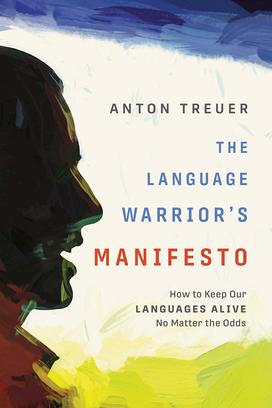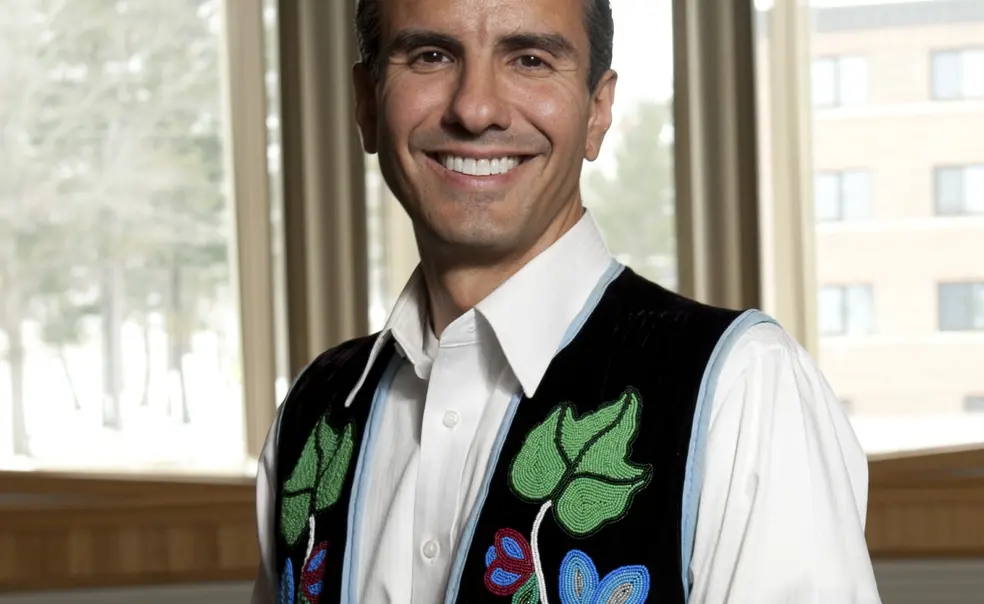Language Warrior Anton Treuer ’91 Revitalizes Ojibwe
The book: While most people view English as America’s native tongue, this assumption overlooks the hundreds of languages indigenous to the land before Europeans settled on it. Anton Treuer ’91, one of a growing number of language warriors fighting for the survival of the 150 remaining indigenous languages in America, is leading a revitalized charge to support the Ojibwe language.
The Language Warrior’s Manifesto: How to Keep Our Languages Alive No Matter the Odds (Minnesota Historical Society Press) discusses the close-knit relationship between culture and language, how language loss happens, and how to fight it. Treuer tells the stories of other language warriors and recounts his own efforts to revive Ojibwe — discussing how he learned the language, why it’s important, and how he and his team of fellow language warriors take action.

The author: Anton Treuer ’91 is a professor of Ojibwe at Bemidji State University and author of 14 books. He is Editor of Oshkaabewis Native Journal, the only academic journal of the Ojibwe language. He has sat on many organizational boards and has received more than 40 prestigious awards and fellowships, including ones from the American Philosophical Society, the National Endowment for the Humanities, the National Science Foundation, the MacArthur Foundation, the Bush Foundation, and the John Simon Guggenheim Foundation.
Opening lines: I am not a likely candidate for teaching, or even having much to say about our language and ways. My father, Robert Treuer, was a white man who spoke nothing but German the first 13 years of his life. My mother, Margaret Treuer, is Ojibwe and grew up in the heart of the Leech Lake Reservation, but like many of her generation, she was the child of parents who spent their formative years in residential boarding schools, where the language was forbidden. Her family experienced hard-living, incredible poverty, and the beauties and struggles of reservation life during the Great Depression and World War II. For generations, nobody in my family and few in my community had received their Ojibwe language and culture as a birthright. I never attended a school that had a real tribal language program. Today I should not know my language, culture, or ceremonies.
But I do know my language, culture, and ceremonies. I speak Ojibwe fluently. I’m not as eloquent as some of our great surviving speakers today. But I officiate at our Medicine Dance, telling legends that are hours long entirely in Ojibwe. I routinely converse in Ojibwe with great speakers from all over Minnesota, Wisconsin, Michigan, Ontario, and Manitoba. I’ve written books in Ojibwe. I dream in my language.
And I am not alone. On the Lac Courte Oreilles Reservation in Wisconsin, a number of families, teachers, and other language activists have done something that hasn’t been done there since World War II: they raised a child who speaks Ojibwe as a first language. And it’s not just one child, it’s over 100. They speak our tribal language, a language that most of their parents and grandparents do not speak.
My story and the story of communities like Lac Courte Oreilles are not isolated developments. They are part of an upswell, a resurgence, a revitalization of indigenous languages and cultures started by language warriors in many places. Their stories are incredible. They are inspiring. And they point the way.
Reviews: “The Language Warrior’s Manifesto is a love story to indigenous language activism. In the days of much-needed indigenous language revitalization, this is a great read for inspiring, learning, and activating oneself.” — Joseph Erb, Digital Storytelling Program, University of Missouri












No responses yet